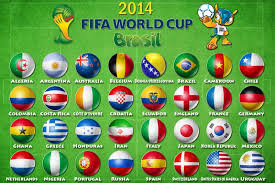By David Owen
June 18 – The confederation covering North and Central America and the Caribbean (CONCACAF) has surprisingly taken the laurels for the best results achieved by its teams after completion of the first round of World Cup matches in Brazil.
After all 32 participating nations had played their first game, teams representing CONCACAF had secured 75% of the points available to them, registering three wins and just one defeat. This gave them the edge over the South American confederation (CONMEBOL) in second place with 66.67%. Europe (UEFA), with more than twice as many squads taking part as any other single footballing region, could only manage third spot, with 48.7%.
Bringing up the rear were the African confederation (CAF) on 26.7% and the Asian confederation (AFC), none of whose four representatives mustered a victory in the opening round of matches, on 16.7%.
Europe’s indifferent record is partly a function of the draw: with Spain playing Holland, in a repeat of the 2010 FIFA World Cup final, Italy taking on England and Germany up against Portugal, some of the strongest European teams almost inevitably suffered defeat. It would be a surprise if UEFA’s score did not rise above 50% by the end of the group phase, when all teams will have played three matches.
It would also be a major surprise if CONCACAF’s impressive total – the product of wins by Mexico (over Cameroon), Costa Rica (over Uruguay), and USA (over Ghana) – did not come down. Already Mexico has had to settle for a draw in its second game, albeit a highly creditable one against hosts Brazil.
Nonetheless, if Europe’s record does not markedly improve over the next two rounds of matches, questions would probably be asked over UEFA’s 13-team allocation and whether it was appropriate for it to retain so large a quota in future World Cups.
The AFC must also be particularly anxious for its score to improve. Japan and South Korea, who reached the semi-finals as co-host in 2002 under Guus Hiddink, both qualified fairly solidly for the round of 16 in South Africa in 2010. Both would presumably have been hoping to build on that this time in Brazil.
Contact the writer of this story at moc.l1744974295labto1744974295ofdlr1744974295owedi1744974295sni@n1744974295ewo.d1744974295ivad1744974295

